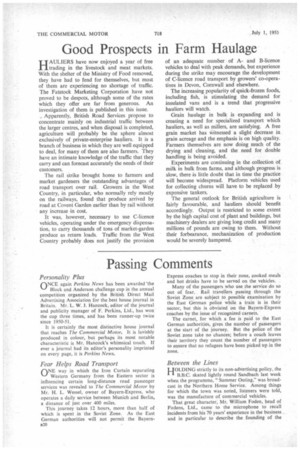Good Prospects in Farm Haulage
Page 46

If you've noticed an error in this article please click here to report it so we can fix it.
HAULIERS have now enjoyed a year of free trading in the livestock and meat markets. With the shelter of the Ministry of Food removed, they have bad to fend for themselves, but most of them are experiencing no shortage of traffic. The Fatstock Marketing Corporation have not proved to be despots, although some of the rates which they offer are far from generous. An investigation of them is published in this issue. , Apparently, British Road Services propose to concentrate mainly on industrial traffic between the larger centres, and when disposal is completed, agriculture will probably be the sphere almost exclusively of private-enterprise hauliers. It is a branch of business in which they are well equipped to deal, for many of them are also farmers. They have an intimate knowledge of the traffic that they carry and can forecast accurately the needs of their customers.
The rail strike brought home to farmers and market gardeners the outstanding advantages of road transport over rail. Growers in the West Country, in particular, who normally rely mostly on the railways, found that produce arrived by road at Covent Garden earlier than by rail without any increase in cost.
It was, however, necessary to use C-licence vehicles, operating under the emergency dispensation, to carry thousands of tons of market-garden produce as return loads. Traffic from the West Country probably does not justify the provision of an adequate number of Aand B-licence vehicles to deal with peak demands, but experience during the strike may encourage the development of C-licence road transport by growers' co-operatives in Devon, Cornwall and elsewhere.
The increasing popularity of quick-frozen foods, including fish, is stimulating the demand for insulated vans and is a trend that progressive hauliers will watch.
Grain haulage in bulk is expanding and is creating a need for specialized transport which hauliers, as well as millers, are satisfying. A free grain market has witnessed a slight decrease in grain acreage and the emphasis is on high quality. Farmers themselves are now doing much of the drying and cleaning, and the need for double handling is being avoided.
Experiments are continuing in the collection of milk in bulk from farms, and although progress is slow, there is little doubt that in time the practice will become widespread. Platform vehicles used for collecting churns will have to be replaced by expensive tankers.
The general outlook for British agriculture is fairly favourable, and hauliers should benefit accordingly. Output is restricted to some extent by the high capital cost of plant and buildings, but machinery dealers are giving long credit and many millions of pounds are owing to them. Without their forbearance, mechanization of production would be severely hampered.












































































































































